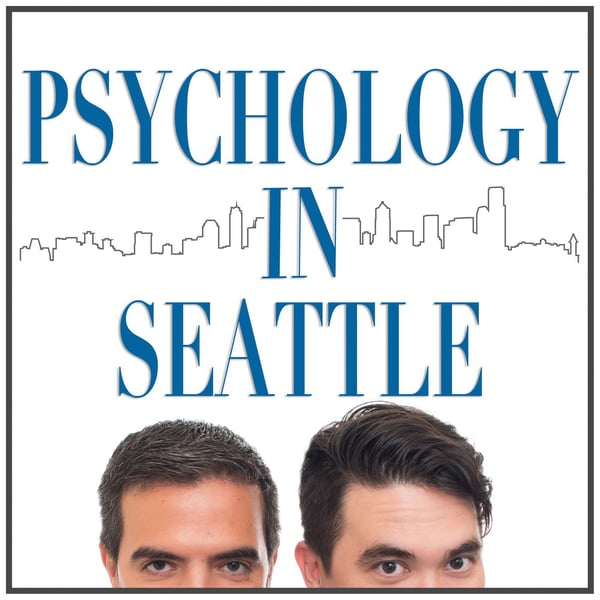Family and Other Emails
Psychology In Seattle Podcast
Kirk Honda
4.6 • 1.2K Ratings
🗓️ 5 May 2021
⏱️ 65 minutes
🧾️ Download transcript
Summary
Become a patron: https://www.patreon.com/PsychologyInSeattle
Email: https://www.psychologyinseattle.com/contact
Get merch: https://teespring.com/stores/psychology-in-seattle
Dr. Kirk’s Cameo: https://www.cameo.com/kirkhonda
Instagram: https://www.instagram.com/psychologyinseattle/
Discord: https://discord.gg/6QR4sE8x9K
Reddit: https://www.reddit.com/r/PsychologyInSeattle/
Twitter: https://twitter.com/PsychInSeattle
Facebook Official Page: https://www.facebook.com/PsychologyInSeattle/
Facebook Fan Page (run by fans): https://www.facebook.com/groups/112633189213033
The Psychology In Seattle Podcast ®
Trigger Warning: This episode may include topics such as assault, trauma, and discrimination. If necessary, listeners are encouraged to refrain from listening and care for their safety and well-being.
Disclaimer: The content provided is for educational, informational, and entertainment purposes only. Nothing here constitutes personal or professional consultation, therapy, diagnosis, or creates a counselor-client relationship. Topics discussed may generate differing points of view. If you participate (by being a guest, submitting a question, or commenting) you must do so with the knowledge that we cannot control reactions or responses from others, which may not agree with you or feel unfair. Your participation on this site is at your own risk, accepting full responsibility for any liability or harm that may result. Anything you write here may be used for discussion or endorsement of the podcast. Opinions and views expressed by the host and guest hosts are personal views. Although, we take precautions and fact check, they should not be considered facts and the opinions may change. Opinions posted by participants (such as comments) are not those of the hosts. Readers should not rely on any information found here and should perform due diligence before taking any action. For a more extensive description of factors for you to consider, please see www.psychologyinseattle.com
This show is part of the Spreaker Prime Network, if you are interested in advertising on this podcast, contact us at https://www.spreaker.com/show/3269717/advertisement
Transcript
Click on a timestamp to play from that location
| 0:00.0 | Hey, deserving listeners, it is just me today. I thought I would answer patron emails. This first email is from patron Keegan, he writes, |
| 0:07.0 | you've talked a lot about family systems and it has opened my eyes to some issues within my own family. |
| 0:12.6 | My older brother, who is 30, has fetal alcohol syndrome and bipolar disorder, but he is very high functioning. |
| 0:19.2 | I've noticed that between him and my grandmother, who raised us, there's an over-functioner, under-functioner relationship. |
| 0:25.5 | Because of his disabilities, most of his life, he has been treated like he is incapable of being responsible for himself as an adult, |
| 0:32.7 | which isn't true. And because my grandmother loves him and worries about him, she frequently tries to be an over-functioner with him. |
| 0:39.3 | My question is, when it comes to people with mental disabilities, |
| 0:42.7 | how do we find a balance of understanding that they need some assistance in life, |
| 0:47.4 | but also not preventing them from being responsible adults through over-functioning end of email? |
| 0:52.8 | Yeah, this is a common issue and it makes sense, right, as you point out, Keegan, that when you have someone with the disability or even like they're insecure or they were traumatized, |
| 1:06.6 | you know, they have reasons to be scared of the world or to have low self-esteem. |
| 1:13.6 | Where do you draw the line as a parent or a caregiver between helping that person in a helpful way, |
| 1:22.0 | and also how do you draw the line between helping them and hindering them? |
| 1:27.2 | Because through over-helping and over-functioning and over-protectiveness, you can harm the child or the adult child, your older brother is 30, |
| 1:40.4 | by giving the impression that the person cannot do things on their own and by teaching the person, the younger person, the dependent person, |
| 1:50.6 | that the world is very scary and that those messages can be so ingrained and so pervasive in the young and the dependent person's psyche that they |
| 2:02.4 | one believe that the world is very, very scary when it isn't as scary as they make it out to be and that they are incapable of navigating those waters. |
| 2:13.1 | So where do you draw the line? Because on one hand, you say that your brother probably needs some help, |
| 2:19.6 | but he doesn't need that much help. You know, it's hard to say, it's hard to navigate that, it's a hard question to answer. |
| 2:27.2 | And in the best of circumstances, even if you have a kid who hasn't any traumas or, you know, has been raised pretty well, |
| 2:34.4 | how do you know that line? Now some kids will make it happen for themselves, they'll just be like, I'm out of here, |
| 2:41.1 | and I'm going to become competent whether you want me to or not because I'm 18, I'm moving out of the house, this is going to happen. |
... |
Please login to see the full transcript.
Disclaimer: The podcast and artwork embedded on this page are from Kirk Honda, and are the property of its owner and not affiliated with or endorsed by Tapesearch.
Generated transcripts are the property of Kirk Honda and are distributed freely under the Fair Use doctrine. Transcripts generated by Tapesearch are not guaranteed to be accurate.
Copyright © Tapesearch 2025.

